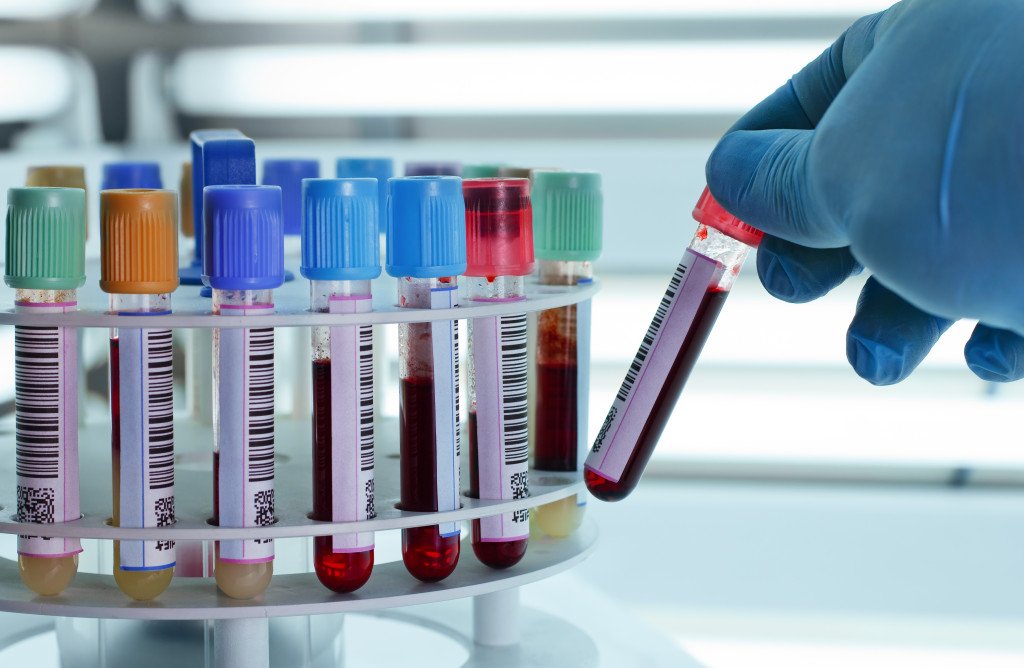TOP 6 Lab Tests For Optimal Health
Lab tests are a direct window into your nutritional status. There are 6 different lab tests I run in my office.
1. Chem55 Blood Panel – Comprehensive Metabolic Panel
The chem55 is a vast panel encompassing everything we can learn from your blood.
A quick overview of what this test covers.
- Energy levels looking at iron and blood sugar
- Sex hormones and thyroid
- Inflammation
- Immune system
- Liver and detox
- Digestion
This panel also includes a comprehensive thyroid panel which looks at how well your thyroid gland is working and how your body is using the two thyroid hormones it produces. We also get a picture of how your immune system is functioning. The chem55 allows us to see the breakdown of your biochemistry in your body.
The most important part of this panel is the ranges. Medical lab ranges for a blood panel are a lot larger than integrative health ranges. For example, doctors look at stimulating thyroid hormone (TSH) to determine how well the thyroid is functioning. TSH for medical lab ranges typically runs from about 0.5 to 4.5, maybe even 5.0, which is a HUGE range. Integrative lab ranges run from 1.8 to 3.0, which is where people with a healthy thyroid fall. A person has to be outside medical lab ranges to be flagged with a problem.

Medicine determines lab ranges with 95% of the people who get blood work done. Everyone with results within that 95% is considered normal. That means you have to be an A+ sick person to be acknowledged as sick. Since I am not looking to diagnose you with a disease, I can look at lab ranges that are about one-third of the size instead of only looking for extreme outliers. Healthy people who feel great have lab numbers that fall into a much tighter range of values. If your values are outside of the integrative range, but they fall within the high end of “normal” medical ranges, I would consider you a “normal” sick person.
You can be inside of medical lab ranges and still not feel right. Even if your values are not high or low enough to raise a flag, they are still signs of dysfunction if outside a genuinely healthy range.
2. Cyrex Array 2 Intestinal Permeability
The Cyrex Array 2 lab tests for intestinal permeability, which is a fancy way of saying “leaky gut.” It determines if your gut is doing its job, keeping food and waste products in the intestines and not letting them leak into the bloodstream. We run this test to determine the state of health of your gut.
3. Cyrex Array 3 (Wheat/Gluten Proteome Reactivity & Autoimmunity) & 4 (Gluten-Associated Cross-Reactive Foods and Foods Sensitivity)
Cyrex Array 3 & 4 tells us if your immune system is attacking foods. There is no reason that your immune system should be attacking food unless the food is leaking into your bloodstream before being well digested. If your immune system is hypersensitized, your immune system recognizes a food even when it is in your gut. Cyrex Array 3 & 4 tells us the health status of your intestines and identifies if you have food sensitivities.

4. Genova Diagnostics Organic Acids Test
The organic acids test is like an exhaust admissions test for your car. We look at the byproducts in the urine because it can tell us how the metabolism is functioning. From this test, we can determine how well you’re taking food and turning it into electricity (called ATP) for your body. If you aren’t making energy from food efficiently, it can explain other problems.
Another problem this test shows us is if you’re making enough neurotransmitters. If you have mood-related issues like anxiety or depression, this test can help us figure out where that break down is occurring. Anxiety and depression are not character issues, and they are not necessarily genetic issues either. A lot of this is just how well your body takes the food you eat and converts it into brain chemicals.
The last component we get from this test is knowing about the balance between good bacteria and harmful bacteria in the gut. Once we have all of this information, we can get specific about how we need to treat you.
5. DiagnosTechs Adrenal Stress Index (ASI)
The Adrenal Stress Index is an excellent test that looks at how much stress hormone you are making throughout the day. By looking at these levels, we can see if you are making an excessive about of stress hormone or not enough. If you’re producing too much stress hormone, immediate changes are necessary to prevent further damage. If you’re making too little stress hormone, you’ve likely been producing too much stress hormone for too long. Your adrenals become exhausted when you have too little stress hormone which shows up as chronic fatigue and exhaustion. If your stress hormone production is irregular, that tells us that rather than being an adrenal gland problem, it is more of a brain problem.
6. Methyl Genetic Genetics Test

This genetic test is not a test that tells you what disease you’re going to get when you age. The methyl genetic test tells us how well you make the processes of your body work. For example, do the genes that code for all the pieces that make your liver function work properly? Your liver is responsible for cleaning up your body, and if you show weakness in one of those genes, then you could have a problem with detoxification. All this means is that you’ll need a little extra support for your liver long term so it can function optimally.
Genetic testing shows us areas where your body needs support long term, and areas that need to be supported short term, but are fixable. With the long term pieces, we now know it is not a lifestyle, diet, or character issue; it’s just something your genes don’t do that well that needs extra support.
I named my practice “Puckette Integrative Healthcare” because we integrate holistic care and science-based protocols like lab testing to get the whole picture of your health.
Here’s to a better life,
Dr. Steve Puckette









